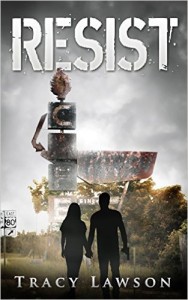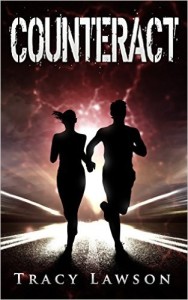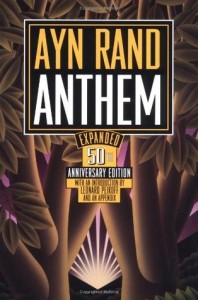By SR Staley
Resist, the second novel in Tracy Lawson’s Resistance Series, picks up right where Counteract leaves off: Heroine Careen Catecher and love interest Tommy Bailey are on the run after the murder of the director of the national Office of Civilian Safety and Defense (OCSD). The OCSD is a federal umbrella agency that has subsumed major bureaucracies such as the FBI, CIA, Department of Homeland Security, and presumably even the Centers for Disease Control. Careen and Tommy have discovered the director of this super agency and his cronies are plotting to use terrorism as a cover to drug the general population under the pretense of inoculating them against biological warfare.
Set in the near future (15 years from current day), the Resistance Series explores the loss of freedom that can creep up on individuals and society through incremental changes that seem small but loom large over time. As Lawson says: “In the Resistance Series, there has been no rebellion, no cataclysmic event. The dystopian world in which they live has been created by fear, engineered by an enemy masquerading as a protector.” The premise is scary enough, and remarkably rooted in modern events and policies, as the controversy surrounding Edward Snowden and leaked classified information on domestic and international spying remind us.
The setting and premise could easily lend itself to an adult thriller by Michael Crichton, but Lawson’s series is firmly rooted in the young adult/new adult genre. The action is faster, and the story carries a syncopated beat that lends itself to the pace of a YA trilogy, not unlike the Hunger Games. In fact, like Katniss Everdeen, Peeta Mellark, and Gale Hawthorne, the protagonists are older teens who are simply trying to get on with their everyday lives. Rather than the post-apocalyptic setting of Panem, in which the vast majority of the population lives in servitude to the Capitol, Lawson’s protagonists are recent high-school graduates focused on the normal current-day activities of enrolling in college and participating in sports. Only an unanticipated series of small events leads them to discover the sinister plot to turn the nation into a mass of compliant citizens under the thumbs of politically powerful bureaucrats. In this way, Lawson’s series is very much grounded in another characteristic of the YA genre: everyday young adults forced to make significant life decisions without the luxury of experience or preparation. Not surprisingly, both Counteract and Resist tend to be plot- and setting-driven stories although the characters have an opportunity to flesh out in important ways in the second book.
 My review of Counteract compared Lawson’s novel to 1984, George Orwell’s classic dystopian story the coined the term Big Brother and wrestled with government over reach, the tyranny of collectivism, and the implications for freedom. About halfway through Resist, I couldn’t stop thinking about the novels of Ayn Rand, especially her 1937 novella Anthem. In Anthem, Rand tells the story of a Equality 7-2521, a person who lives in a community in which individuality has been purged from the formal institutions of society. A Council of Vocations assigns jobs to people based on what they determine is their Life Mandate. The story follows Equality’s evolution into an individual as he discovers his natural inquisitiveness and intelligence leads him to innovate and produce. Through unregulated exploration, he discovers the word “I” and finds freedom.
My review of Counteract compared Lawson’s novel to 1984, George Orwell’s classic dystopian story the coined the term Big Brother and wrestled with government over reach, the tyranny of collectivism, and the implications for freedom. About halfway through Resist, I couldn’t stop thinking about the novels of Ayn Rand, especially her 1937 novella Anthem. In Anthem, Rand tells the story of a Equality 7-2521, a person who lives in a community in which individuality has been purged from the formal institutions of society. A Council of Vocations assigns jobs to people based on what they determine is their Life Mandate. The story follows Equality’s evolution into an individual as he discovers his natural inquisitiveness and intelligence leads him to innovate and produce. Through unregulated exploration, he discovers the word “I” and finds freedom.
Resist, fortunately, is not nearly as abstract as Anthem, making it much more suitable for YA audiences. It’s relentless focus on personal freedom and the right to live independently of the government is strong and tightly woven into the plot, and the action keeps the reader engaged. More importantly, however, as the characters develop, we see in Resist the makings of a trilogy that provokes readers in ways that more popular genre fiction doesn’t. Katniss Everdeen, for example, remains remarkably apolitical through the trilogy despite bearing witness to extraordinary oppression.
Lawson has the refreshing courage to push her characters to act and take responsibility for their actions. They don’t just bear witness. They recognize and accept the responsibilities that come with the knowledge they gain. And they act. Thus, unlike other YA fare, the Resistance Series admirably challenges its readers to ask themselves “What would you do?” and explores the implications of acting on those decisions.
For those looking for an engaging, YA adventure/thriller with strong pro-personal liberty themes, the Resistance Series should have a highly visible place in their book case or on their e-reader.